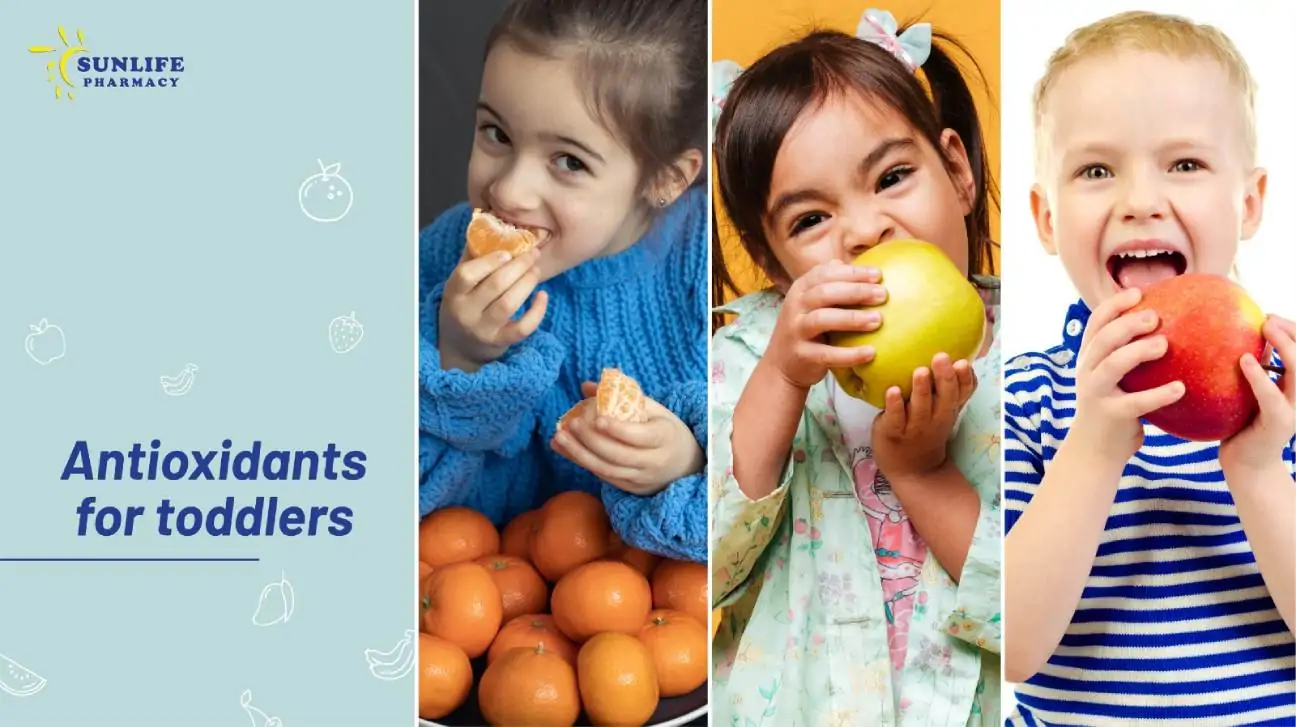Antioxidants for Toddlers

Nutrition plays an important role in your baby’s brain development and this has been known for almost over a 100 years. Our brain is the most valuable physical possession that we have. It drives our entire existence, which comprises our intelligence, personality, and emotional well-being. An optimally functioning brain is the key to a successful and fulfilling life. You can enhance this for your baby by providing nutritional adequacy and mental and physical activity.
Vitamins are one of the important nutrition components for brain development, which can be obtained from several food sources. Of these dietary vitamins, the 3 most important vitamins are Vitamin A, C and E because of the role they play in the growth and development of the brain and nervous system during the pregnancy period. Hence, the deficiency of these 3 important vitamins affects the cognitive function and motor skills of the child. Brain Food For Toddlers Ever wonder how to boost your child’s brain power? You can give your toddler a great mental jumpstart with a few important nutrients: antioxidants, omega-3 fatty acids and iron!
Antioxidants
These nutrition superstars protect your toddler’s brain from normal wear and tear. Some familiar antioxidants include vitamin C (citrus fruits, red and green bell peppers, tomatoes and broccoli), beta-carotene (carrots), and vitamin E (vegetable oils, nuts and seeds). Recent research has shown that other substances called phytonutrients have antioxidant properties too. One of these is lycopene, found in red foods like watermelon and tomatoes. Look to fruits and veggies — the darker the color, the more antioxidant-packed! Tempt your toddler with a berry yogurt smoothie for breakfast. Give raspberries, blackberries, strawberries or blueberries for a snack. Serve spaghetti with a sauce rich in tomatoes, shredded carrots and bell peppers for dinner.
Omega-3 fatty acids
These healthy fats are important for a child’s developing brain and vision. They are considered essential fats, meaning that our bodies don’t make them and we need to get them from food sources. Where to find them? Fish, such as salmon, have the highest amount of omega-3 fatty acids. Walnuts and flaxseeds are also good sources but they have a different form of this fat which may not provide all the same health benefits. Many foods — such as eggs, milk, soy beverages, juice, yogurt, bread, cereal and margarine — are now fortified with omega-3s. Look for products that contain at least 50 milligrams of Docosahexaenoic acid (DHA) per serving.
Nutritionplays an important role in your baby’s brain development and this has been known for
almost over a 100 years. Our brain is the most valuable physical possession that we have. It
drives our entire existence, which comprises our intelligence, personality, and emotional
well-being. An optimally functioning brain is the key to a successful and fulfilling life. You can
enhance this for your baby by providing nutritional adequacy and mental and physical activity.
Vitamins are one of the important nutrition components for brain development, which can be
obtained from several food sources. Of these dietary vitamins, the 3 most important vitamins are
Vitamin A, C and E because of the role they play in the growth and development of the brain and nervous system during the pregnancy period. Hence, the deficiency of these 3 important vitamins affects the cognitive function and motor skills of the child.
Omega-3 fatty acids These healthy fats are important for a child’s developing brain and vision.

They are considered essential fats, meaning that our bodies don’t make them and we need to get them from food sources.
Where to find them? Fish, such as salmon, have the highest amount of omega-3 fatty acids.
Walnuts and flaxseeds are also good sources but they have a different form of this fat which
may not provide all the same health benefits. Many foods — such as eggs, milk, soy beverages,
juice, yogurt, bread, cereal and margarine — are now fortified with omega-3s. Look for products
that contain at least 50 milligrams of Docosahexaenoic acid (DHA) per serving.
Antioxidants rich fruits
Look to fruits and veggies — the darker the color, the more antioxidant-packed! Tempt your toddler with a berry yogurt smoothie for breakfast. Give raspberries, blackberries, strawberries or blueberries for a snack. Serve spaghetti with a sauce rich in tomatoes, shredded carrots and bell peppers for dinner. Omega-3 fatty acids These healthy fats are important for a child’s developing brain and vision. They are considered essential fats, meaning that our bodies don’t make them and we need to get them from food sources. Where to find them? Fish, such as salmon, have the highest amount of omega-3 fatty acids. Walnuts and flaxseeds are also good sources but they have a different form of this fat which may not provide all the same health benefits.
Many foods — such as eggs, milk, soy beverages, juice, yogurt, bread, cereal and margarine — are now fortified with omega-3s. Look for products that contain at least 50 milligrams of Docosahexaenoic acid (DHA) per serving. Salmon fillets, omega-3 fatty acidsFor breakfast, serve walnut and blueberry pancakes with omega-3 fortified orange juice. Use omega-3 fortified eggs to whip up an omelet with bell peppers. Prepare a sandwich at lunch with omega-3 fortified bread. Serve salmon fillets at dinner. Iron If a child is deficient in iron, they may have a hard time concentrating in school and may not reach their potential. In the U.S., almost 1 in 10 toddlers (ages 1 to 3 years old) are iron deficient.
Iron
The best source of iron comes from red meats. Breads, pasta and cereals are often fortified with iron too. Vitamin C (an antioxidant!) can triple the amount of iron the body absorbs. Iron If a child is deficient in iron, they may have a hard time concentrating in school and may not reach their potential. In the U.S., almost 1 in 10 toddlers (ages 1 to 3 years old) are iron deficient. The best source of iron comes from red meats. Breads, pasta and cereals are often fortified with iron too. Vitamin C (an antioxidant!) can triple the amount of iron the body absorbs.
Spaghetti and meatballs, ironServe some antioxidant and vitamin C rich spaghetti sauce with meatballs made from ground sirloin and a little cereal as the binder for the meatballs. Add a slice of garlic bread with omega-3 fortified margarine, and you’ve got a nutrient packed meal perfect to boost your toddler’s brain power! Shopping list for brain foods
- Berries
- Bell peppers
- Tomatoes
- Broccoli
- Carrots
- Salmon
- Omega-3 fortified eggs
- Omega-3 fortified orange juice
- Ground sirloin
- Iron-fortified cereal


